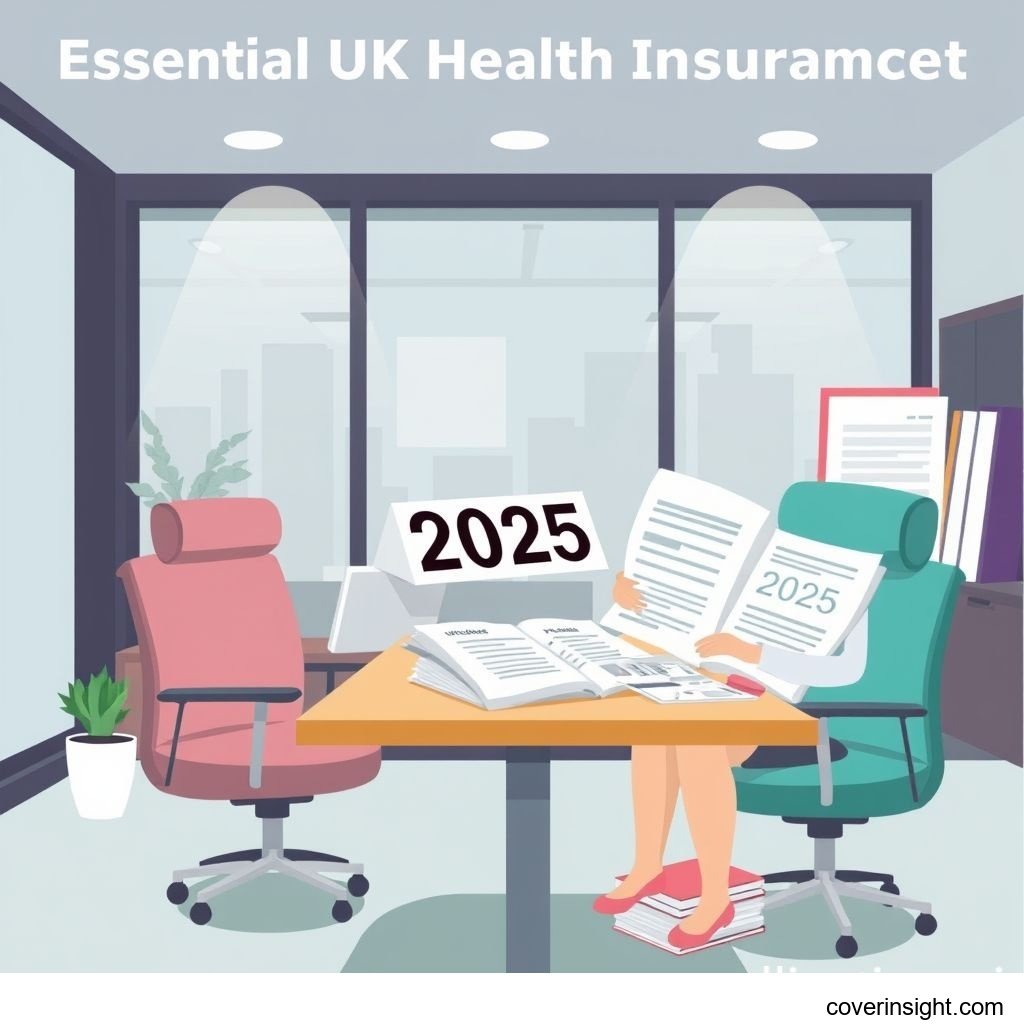Bypass NHS Waits: Chronic Care Health Insurance GB 2025
Introduction
In Great Britain, managing a chronic condition in 2025 often comes with a unique set of challenges, particularly when relying solely on the public healthcare system. While the NHS provides excellent care, the sheer volume of patients means that waiting times for specialist consultations, diagnostic tests, and ongoing treatments for long-term illnesses can be, frankly, dishearteningly long. For conditions that require consistent monitoring and timely intervention, these delays aren't just an inconvenience; they can significantly impact quality of life and even prognosis. This is where private chronic care health insurance steps in, offering a pathway to quicker diagnosis and more immediate access to the ongoing management essential for thriving with a long-term health issue.
Coverage Details
Navigating the complexities of chronic care health insurance requires a good grasp of what you’re actually buying into. It’s not a one-size-fits-all solution, and understanding the inclusions and exclusions is key to finding a policy that truly fits your needs.
What’s Included
For those living with chronic conditions, health insurance can be a genuine game-changer. Typically, these policies are designed to cover the costs associated with a newly diagnosed chronic condition or, in some specialist cases, provide ongoing management for existing ones, subject to specific underwriting. You can expect cover for:
-
Specialist Consultations: Quick access to consultant appointments with neurologists, cardiologists, rheumatologists, or any other specialist relevant to your chronic condition, bypassing lengthy NHS referral queues.
-
Diagnostic Tests: Expedited MRI scans, CT scans, blood tests, and other crucial diagnostics needed for accurate diagnosis and ongoing monitoring. For someone awaiting a crucial diagnosis, this can feel like a godsend.
-
Ongoing Management: Once a chronic condition is diagnosed and covered, policies often provide for the long-term management of the condition. This can include regular follow-up appointments, prescribed medication (though often with limits or co-payments), and even some forms of therapy or rehabilitation relevant to the condition, such as physiotherapy or occupational therapy.
-
Day-Patient and In-Patient Treatment: Cover for hospital stays, surgical procedures, and medical treatments directly related to your covered chronic condition.
-
Home Nursing or Palliative Care: Some premium policies may offer support for nursing care at home or provide contributions towards palliative care, which can be invaluable during challenging times.
Common Exclusions
While private health insurance offers a tempting alternative to NHS waits, it’s not a magic wand. There are standard exclusions you need to be aware of:
-
Pre-Existing Conditions: This is the big one. Most standard private health insurance policies in GB will not cover conditions you had before taking out the policy. While some specialist policies might offer cover after a waiting period (often 2-5 years) or under a full medical underwriting basis, it's rarely straightforward for already diagnosed chronic conditions.
-
Emergency Care: For immediate, life-threatening emergencies, the NHS remains the primary port of call. Private insurance typically doesn't cover A&E visits or emergency medical interventions unless it leads to an inpatient admission that is then covered by your policy.
-
Routine GP Visits: Private health insurance usually focuses on specialist and hospital care, not your everyday GP appointments.
-
Cosmetic Surgery: Procedures purely for aesthetic reasons are almost always excluded.
-
Experimental Treatments: Unproven or experimental therapies are generally not covered.
-
Normal Pregnancy and Childbirth: While complications might be covered, standard maternity care is typically excluded.
-
Drug or Alcohol Abuse: Treatment related to substance abuse is usually not covered.
Cost Analysis
The thought of private healthcare can often conjure images of exorbitant bills, but with careful planning, chronic care health insurance can be a manageable expense, especially when weighed against the peace of mind it offers.
Price Factors
The cost of your chronic care health insurance premium is not pulled out of a hat; several factors play a significant role:
-
Age: Generally, the older you are, the higher your premiums. As we age, the likelihood of developing chronic conditions increases.
-
Medical History & Lifestyle: Your past health, smoking status, and Body Mass Index (BMI) can all influence the premium. A healthier lifestyle can sometimes lead to lower costs.
-
Postcode: Healthcare costs can vary regionally across GB, influencing premiums. For instance, private treatment costs might be higher in London than in, say, the North East.
-
Level of Cover: A comprehensive policy with extensive benefits and fewer exclusions will naturally cost more than a basic plan.
-
Excess: This is the amount you agree to pay towards a claim before your insurer pays the rest. A higher excess usually means a lower premium.
-
Underwriting Method: Whether you choose "moratorium" (pre-existing conditions excluded for a set period, then potentially covered if no symptoms) or "full medical underwriting" (you declare everything upfront, and the insurer decides what to cover) impacts cost and coverage.
Saving Tips
A penny saved is a penny earned, as they say, and there are several ways to make chronic care health insurance more affordable without compromising too much on essential coverage:
-
Shop Around: Don’t just go with the first quote. Use comparison websites or brokers to compare policies from various providers. The market is competitive, and prices can vary wildly.
-
Increase Your Excess: If you’re able to cover a portion of the cost yourself, opting for a higher excess can significantly reduce your monthly or annual premium.
-
Consider a 6-Week Wait Option: Some policies offer a lower premium if you agree to use the NHS for treatment if the NHS waiting list is under a certain period (e.g., six weeks). This can be a useful hybrid approach.
-
Maintain a Healthy Lifestyle: While not an immediate saving, a healthier lifestyle can lead to lower premiums over time, especially if you have an annual review of your policy.
-
Review Annually: Your needs and the market change. Make it a habit to review your policy every year to ensure it still offers the best value and coverage for your situation.
-
Group Policies: If your employer offers health insurance as part of a benefits package, it’s often much cheaper than taking out an individual policy, as the risk is spread across a larger group.
FAQs
How much does chronic condition management cost? The overall cost of managing a chronic condition without insurance can be substantial, running into thousands or even tens of thousands of pounds annually depending on the condition, medications, and necessary interventions. With private chronic care health insurance, while you pay a premium, it covers the majority of these costs, offering financial predictability. A recent report by a credible local body highlighted that the average cost of a private hip replacement in GB, for example, can be £13,000-£15,000, underscoring the potential financial burden without cover.
What affects premiums? Premiums are primarily affected by your age, where you live in Great Britain, your health and medical history, your lifestyle choices (like smoking), the level of cover you choose (e.g., outpatient limits, hospital choice), and the excess you agree to pay on claims. Essentially, the higher the perceived risk to the insurer or the more comprehensive the cover, the higher the premium. For more detailed information on regulatory practices, you might want to consult the Financial Conduct Authority.
Is it mandatory? No, chronic care health insurance is not mandatory in Great Britain. It is a personal choice based on your financial situation, health needs, and desire for quicker access to private healthcare services. However, as someone living in GB, I've observed that for many, it's increasingly becoming a 'nice to have' that's almost morphing into a 'must-have' for peace of mind, especially with the pressures on the public system. For general guidance on insurance, you can also check Insurance Resources Global.
How to choose? Choosing the right policy involves assessing your specific health needs (considering what chronic conditions you might be concerned about), comparing different providers' benefits and exclusions, looking at their customer service reputation, and understanding the fine print regarding chronic condition coverage. Don't be afraid to ask questions and always get a full breakdown of what is and isn't covered. Consulting the Association of British Insurers can provide industry insights. Also, ensure the insurer is regulated by the Financial Conduct Authority (FCA). For more information on finding the right fit for you, visit GB Insurance Home.
Consequences of no coverage? Without private chronic care health insurance, you are solely reliant on the NHS. The primary consequence is potentially long waiting times for diagnosis, specialist consultations, and treatments. For example, recent NHS data reveals that millions are on waiting lists for elective care, with some patients waiting over a year for crucial appointments. This delay can lead to the progression of a chronic condition, increased pain, reduced quality of life, and in some cases, poorer long-term outcomes. Furthermore, if you choose to go private without insurance, the costs would be entirely out-of-pocket, which can quickly become a significant financial burden.
Author Insight & Experience
Based on my experience, navigating the healthcare landscape in GB with a chronic condition can feel a bit like being caught between a rock and a hard place. The NHS, bless its cotton socks, does its best, but the reality of long waits for non-urgent but essential chronic care can be incredibly stressful. I've seen firsthand how access to timely diagnostics and specialist opinions through private insurance can not only alleviate anxiety but genuinely make a difference in managing a long-term condition. It's not about abandoning the NHS, but rather about having an additional arrow in your quiver, a safety net that ensures you're not left in limbo when your health is on the line. It's truly worth its weight in gold for the peace of mind alone.








Comments